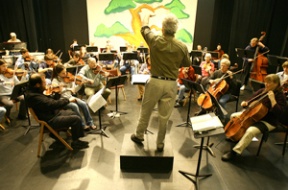Shostakovich works highlight a program by the Bainbridge Symphony Orchestra.
Dmitri Shostakovich left Soviet bureaucrats scratching their heads.
The composer advanced his “Ninth Symphony” as a paean to Russia’s defeat of Nazi Germany. But somewhere on the road to completion, the symphony de-escalated into something short and lighthearted, filled with sly musical and political jokes.
That, Zon Eastes said, is “so Shostakovich.”
“He could turn a sweet tune bitter or a bitter tune sweet. He had an incredible facility back and forth that way,” said Eastes, who will direct the Bainbridge Symphony Orchestra in a program called “The Spirit of Russia” this weekend. “He was always calculating risks and always guessing at what he might be able to do.”
Shostakovich had what Eastes termed a complex relationship with his government. He remained in Soviet Russia when many of his contemporaries left, holding government posts, receiving state awards and writing sincerely nationalistic symphonies.
Yet his 1945 “Ninth Symphony” illustrated his volleying East-West sensibilities and pointed to an underlying disaffection for Joseph Stalin’s regime.
Even the symphony’s name oozed irony, as it mimicked Beethoven’s 1824 Symphony No. 9, regarded worldwide as the model for a rousing nationalistic anthem – albeit German.
“Who knows,” said Eastes, “exactly what was going on in Shostakovich’s mind.”
The “Ninth Symphony” and other “Spirit of Russia” selections, which include works by Glinka, Mussorgsky and Tchaikovsky, have more in common than their country of origin.
“There is a very nice continuation and line of thought through all the pieces,” Eastes said, with every selection representing Russia at a different moment in its struggle with nationalism.
Mikhail Glinka is widely considered the father of Russian national music, Eastes said, and “had a huge effect on the notion of a national voice for Russia,” one that “Russlan and Ludmilla” showcases.
Glinka influenced the next generation of composers including Mussorgsky, who favored historic and folkloric themes. His orchestral tone-poem “A Night on the Bald Mountain” is a familiar example.
The orchestra’s lineup was originally conceived by former music director Alan Futterman and included a selection from Prokofiev’s “Romeo and Juliet” that would have required an expanded orchestra and ambitious staging.
When Futterman departed after just two concerts, Eastes suggested substituting new works while keeping the Mussorgsky to round out the concert’s first half.
He thought the pieces would mesh with the program; he’d also conducted them both before.
How Eastes became guest conductor points to what he termed a “wonderful dialogue” between arts administrators on Bainbridge and the artists they serve.
After decades as a cellist, teacher and music director, Eastes came to the island last September to head up the Bainbridge Arts and Humanities Council.
When Futterman resigned, Eastes called BPA Managing Director Christopher Shainin and asked how he could help.
While Eastes didn’t pointedly offer to conduct at that point, Shainin and others knew his history. The guest conductorship seemed a natural fit.
According to Dick Heine, symphony manager and bass trombonist, the orchestra responded well to Eastes’ lead.
“I get a kick out of Zon on the podium,” he said.
For the second half of the concert, the original Tchaikovsky selection stayed put, with 17 year-old cello soloist Lavena McCall Johanson already on board to play with the BSO Chamber Orchestra.
Harold Johanson, a member of the bass section who also holds master’s degree in conducting, will lead that piece.
Johanson said he appreciates the lyrical and technical aspects of “Variations on a Rococo Theme,” but also couldn’t resist the “extra measure of joy” afforded by the chance to conduct his daughter.
At a recent open rehearsal, Eastes took the orchestra through the Mussorgsky in its entirety.
As he assessed the run-through, he may have been talking about the orchestra itself.
“There are a lot of good things happening,” he said.
************************************************************
Mother Russia
The Bainbridge Symphony Orchestra, under the baton of Zon Eastes and Harold Johanson performs “The Spirit of Russia” at 7:30 March 10 and 3 p.m. March 11 at Bainbridge Performing Arts. For tickets, call the box office at 842-8569 or see www.theplayhouse.org.



